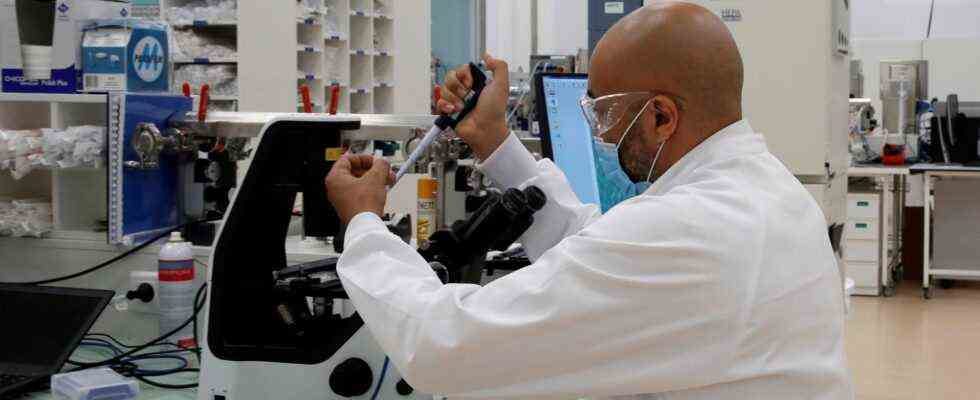Exclusive
Status: 04.07.2021 6:00 p.m.
Scientists at Oxford University have determined that the results of almost 6,000 medical studies in the EU are not published. This is a massive shame for patients, experts criticize.
From Markus Grill,
NDR / WDR
In 2018 Michael Zehnbauer got a terrible diagnosis: bile duct cancer. It was terrible because the average life expectancy with this disease is only two years and Zehnbauer was 53 years old at the time. He turned to his nephew Peter Grabitz, who was just completing his medical degree at the Berlin Charité. Grabitz searched the Internet for studies with new drugs that might help his uncle in Bavaria.
When the doctors examined his tumor closely, they discovered that a certain gene was mutated and the pharmaceutical company Celgene was also testing its blood cancer drug Enasidenib for the type of cancer Zehnbauer suffered from.
The study ran at several US clinics and was completed in 2016. But as much as Grabitz searched the databases, he couldn’t find any results from that study. Zehnbauer is placing his hopes fully on the active ingredient from Celgene.
Michael Zehnbauer wanted a drug for which the study results were not published.
No answer from the pharmaceutical company
But how effective was enasidenib against biliary tract cancer? Grabitz wrote to the pharmaceutical company, but received no further information from there. “My uncle really wanted this drug,” says Grabitz, “even if the benefits were completely unclear.”
A few months later, however, the uncle’s state of health deteriorated so rapidly that his doctors refused to give him the remedy, which can also have severe side effects. He died on February 15, 2019.
But why did Celgene not publish the study results? The company was bought by the British pharmaceutical company Bristol Myers Squibb (BMS) in 2019. On request, BMS now announces that it did not find out until 2021 that “the results of this study were inadvertently not published”. As a result, according to the company, “the appropriate steps were taken to disclose.”
Studies have to be published
The study has now actually been published. While enasidenib was effective in blood cancer, not a single study participant with biliary tract cancer had benefited from the drug. “So the preparation would not have helped my uncle,” says Doctor Grabitz, “but it would have saved him a painful time of false hope and uncertainty if Celgene had published the study results earlier.”
The non-publication of study results has been an annoying topic for many medical professionals for years. The rules are clear: every pharmaceutical company and every university that tests drugs on people must register the study in the EUCTR public database and publish the results within one year of the study being completed.
But in many European countries the supervisory authorities do not seem to insist on compliance with these rules – not even in Germany. This is the result of a previously unpublished evaluation by scientists from Oxford University and the non-governmental organization TranspariMed, which has repeatedly published reports on this topic in the past.
Biggest gaps in Italy
The researchers discovered a total of 5,976 studies in 14 European countries that were approved in 2015 or earlier and that can be assumed to have been completed in the meantime, but the results of which have not yet been published. The largest gaps are found in Italy (1221 studies without published results), Spain (884), the Netherlands (839) and France (698). This is followed by Germany with 554 studies in which the results are missing. After all, that’s 56 percent of all studies for which one can expect results.
For these studies, the national authorities failed to request the publication of the study results, according to TranspariMed founder Till Bruckner. It is important to at least make the results available to other doctors in abbreviated form, even if the publication of a scientific article is planned later.
The Federal Institute for Drugs and Medical Devices has “no statutory powers of sanction” to punish those responsible for studies if results are not published.
No legal sanctioning powers
Confronted with the allegations, the Federal Institute for Drugs and Medical Devices (BfArM) replies NDR, WDR and SZ that the authority has “no legal sanctioning powers” to punish those responsible for studies if the results are not published in the EU database.
At the beginning of May, various organizations, including TranspariMed, Cochrane and Transparency International, appealed to BfArM President Karl Broich to work internationally to improve transparency. Broich coordinated with the heads of authorities in other EU countries and appealed to the EU to emphasize the publication obligations with the “creation of legal regulations”, as BfArM spokesman Maik Pommer announced.
Great Britain as a model
Great Britain, of all countries, which has left the EU, shows that there is another way. According to the analysis by TranspariMEd, there is not a single completed national study whose results have not yet been published. Internationally, Germany is also in the midfield when it comes to the question of whether ongoing studies are even visible in the EU database: According to this, seven percent of all studies are not even registered there.
Hiding studies not only harms patients, says TranspariMed founder Bruckner, but is also a waste of government research funds because the same study may be carried out in different places without the researchers knowing about each other.
According to Natalie Rhodes from Transparency International Global Health, the new study paints a “blatant picture” of how differently the regulations are observed in different European countries. Study transparency must also “be taken much more seriously by the supervisory authorities across Europe”.

